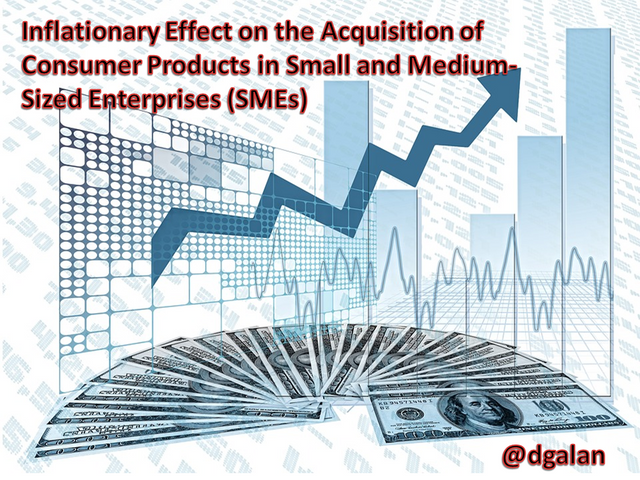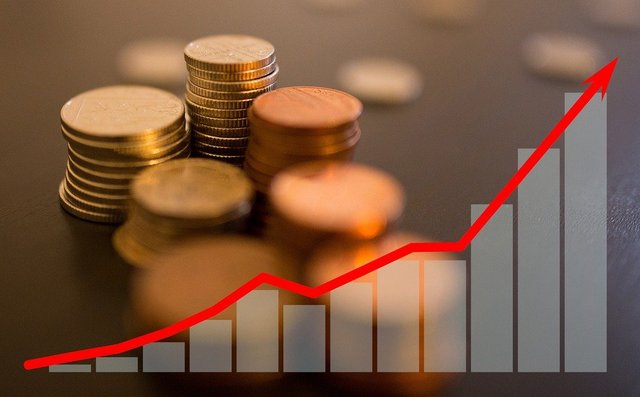Written by:Diomer Antonio Galán Rincón.
Bachelor's Degree.Public Accounting / MSc.Science of Higher Education.

Author: @dgalan,through Power Point 2010 tool, and using public domain image Pixabay
Knowing that inflation is the generalized and sustained increase of prices over time, in terms of the goods traced in an economy, we can say that it is one of the most important economic variables that, if controlled, can guarantee the stability and competitiveness of products in the national and international market.
It is not a secret that Venezuela has been suffering consequences derived from an inflationary process, in one way or another affecting the country's economy in an exaggerated manner, directly causing shortages of human consumption products, the loss of the purchasing value of the currency, reaching one of the highest inflation indexes at present.
Inflation has increased in our country due to a series of economic phenomena which have to do with the progressive increase in the prices of the products that comprise the basic food basket.
It is worth mentioning that despite the existence of laws that regulate their value, these have become goods that are difficult to control and acquire at the same time. However, this situation has generated negative effects, known as higher operating costs, lower working capital, deficit in acquisition and sales volumes, among others.

Image taken from:Pixabay
On the other hand, Maza Zabala (1992) defines inflation as: "A process of continuous increase in the prices of goods and services in an economy over a relatively long period of time". In the Venezuelan case, it is very difficult to acquire many of the products that are considered indispensable to cover basic needs, these needs are condensed in what is known as the basic basket.
It is worth mentioning that even though this inflationary process directly affects the final consumer, small and medium sized companies (PYMES) do not escape from it, showing discontent due to the lack of availability of products (merchandise), as well as the deterioration of the real salary for their workers, the shortage, and the increase in the prices of products, thus causing losses in the economic exercise.
I hope you like my article and I would appreciate all your comments.
bibliography consulted:

Greetings friend @dgalan the inflationary problem affects a lot to small and medium enterprises, I am because every day that price to replenish their merchandise increases, and often when selling their inventory is not enough to replace the amount they sold, which is why companies currently express their prices in dollars ($) in order to obtain a more stable currency than the legal tender in the country, and thus achieve mitigate the loss of money and the decrease of its inventory, thank you very much for sharing this topic.
Downvoting a post can decrease pending rewards and make it less visible. Common reasons:
Submit
Greetings @ chucho27. Very true your appreciation, regarding the strategy of traders to charge their products in a foreign currency, such as the dollar in order to safeguard the replacement costs of their inventories. However, the hyperinflation that we live in our country and the lack of price control makes in many cases that even though the charge is in the dollar currency, when they go to buy the merchandise, this has a higher cost than the previous month, since the Venezuelan market devalues even foreign currencies bringing a problem that has no solution.
Thank you very much for your comments
Downvoting a post can decrease pending rewards and make it less visible. Common reasons:
Submit
Greetings friend @dgalan, the topic you touch on in this publication is very important, as one of the dire consequences of a series of erroneous economic policies applied by the Venezuelan government.
It also seems to me quite correct that it approaches it from the point of view of the businessman and not the consumer, since the government has been in charge of promoting an opinion matrix in which the blame for all the economic ills of Venezuela are the product of external factors. or the business community, without stopping to recognize that it is precisely the lack of investment and therefore the lack of national production are two of the causes why the valuation of our currency is decreasing and why the cost of production increases ( increase in inflation.)
Best regards friend!
Downvoting a post can decrease pending rewards and make it less visible. Common reasons:
Submit
Greetings @ karupanocitizen
Very accurate your opinion about the bad economic decisions implemented by the government. However, I think that we should all contribute to counteract this economic phenomenon that Venezuela presents, since there are no economic theories to support it and it is of international study.
We cannot deny the lack of investment by the state to help the merchant, added to this the distortion in the sales of goods and services by the merchant, without complying with the established profit margins that do not contribute to the stability of the markets, all these elements make the economy not to have a balance. It is with the task of all that can be stabilized for the good of the country.
Thank you very much for your comments
Downvoting a post can decrease pending rewards and make it less visible. Common reasons:
Submit
@tipu curate 6
Downvoting a post can decrease pending rewards and make it less visible. Common reasons:
Submit
Upvoted 👌 (Mana: 0/5) Get profit votes with @tipU :)
Downvoting a post can decrease pending rewards and make it less visible. Common reasons:
Submit
Thank you for your support
Downvoting a post can decrease pending rewards and make it less visible. Common reasons:
Submit